- Home
- Sustainability Report
- Environment
- Resource Recycling Initiatives
- Waste Reduction and Recycling in the Manufacturing Business
Waste Reduction and Recycling in the Manufacturing Business
Initiatives at Domestic Manufacturing Facilities
The Sumitomo Forestry Group is making ongoing efforts to reduce waste emissions, for example by tightening the sorting of industrial waste at each manufacturing plant, promoting its effective use as resources without simple incineration (thermal use), and selling it for a profit. The Sumitomo Forestry Group managed to achieve a recycling rate of 99.6% against the target of 99.5% in fiscal 2023. Zero emissions (recycling rate of 98% or more) were achieved at offices of Sumitomo Forestry Crest, Sumitomo Forestry Landscaping and Agro-Products division.
Recycling Rate at Domestic Manufacturing Plants*
(Sumitomo Forestry Crest, the Agro-Products division of Sumitomo Forestry Landscaping, Japan Bio Energy, Okhotsk Bio Energy, Michinoku Bio Energy)
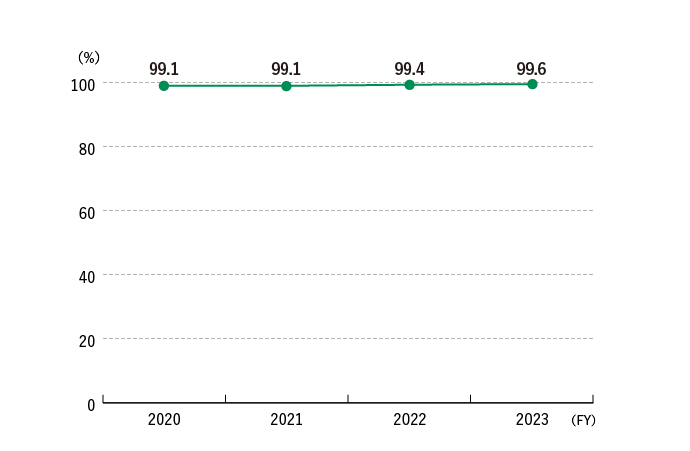
Breakdown of Waste Generated at Domestic Manufacturing Plants (FY2023)
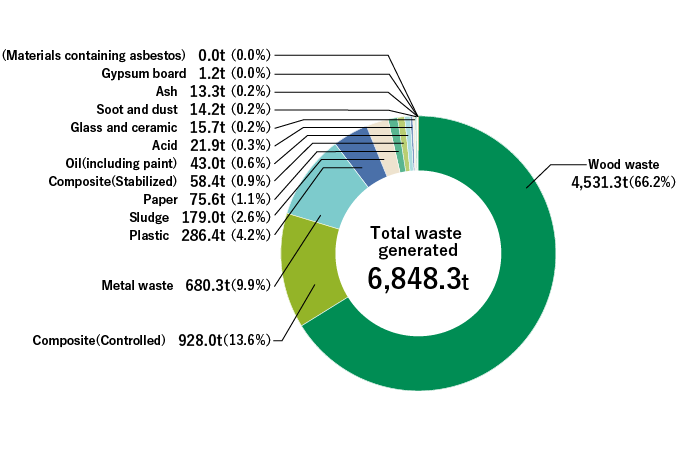
Initiatives at Overseas Manufacturing Plants
Eight major overseas manufacturing plants* are promoting zero emissions. Offcuts generated at plywood and building materials mills is reused as raw material for wooden board mills, and at wooden board mills, waste wood from the manufacturing process is reused as fuel for heat sources in the drying and thermal pressing processes. We also promote zero-emission activities by making effective use of all types of wood waste, such as using the offcuts generated at our wooden mills for novelty goods.
In fiscal 2023, recycling rate was 95.7%, against our target of 98.0%, and we were unable to achieve zero emissions. Main factor that could not be achieved is that in Kutai Timber Indonesia (KTI) which is a subsidiary manufacturing company of Indonesia, with promotion of use of wood from planted forest, there has been an increase in those which cannot be used as a boiler fuel for private use. Because of its high water content and low combustion efficiency, KTI is unable to use a large amount of wood from planted forest at one time. This has led to an increase in incineration and landfill waste, resulting in a lower recycling rate.
*Indonesia: PT. Kutai Timber Indonesia, PT. Rimba Partikel Indonesia, and PT. AST Indonesia
New Zealand: Nelson Pine Industries Ltd.
Vietnam: Vina Eco Board Co., Ltd.
United States: Canyon Creek Cabinet Company
Thailand: Pan Asia Packing Ltd.
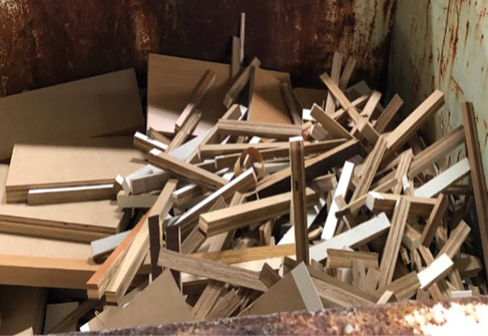
Recycling by sorting waste
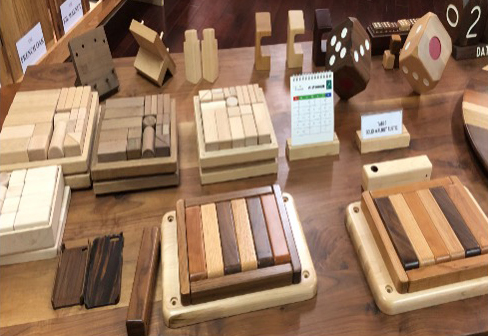
Recycling by sorting waste manufacturing as raw materials for novelty goods
Breakdown of Waste Generated at Overseas Manufacturing Plants (FY2023)
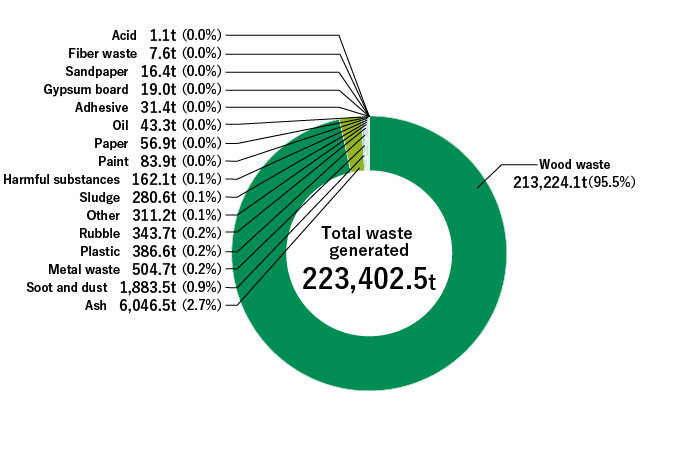
- Click here for related information
Japan Bio Energy Recognized as Superior Industrial Waste Disposal Operator
Japan Bio Energy, which manufactures and sells wood biomass chips, has been recognized as a superior industrial waste disposal operator since 2016 by Kawasaki City.
The system to recognize superior industrial waste disposal operators evaluates and certifies superior industrial waste disposal operators through the prefecture or city. In order to receive this recognition, the business must satisfy a full set of criteria including legal compliance, business transparency, efforts in environmental conscious, and a healthy financial strength. The validity of certification in industrial waste disposal is extended from five to seven years by receiving recognition through this system. In addition, current waste disposal business license and certification as a superior industrial waste disposal operator were renewed in May 2023.
- Home
- Sustainability Report
- Environment
- Resource Recycling Initiatives
- Waste Reduction and Recycling in the Manufacturing Business

